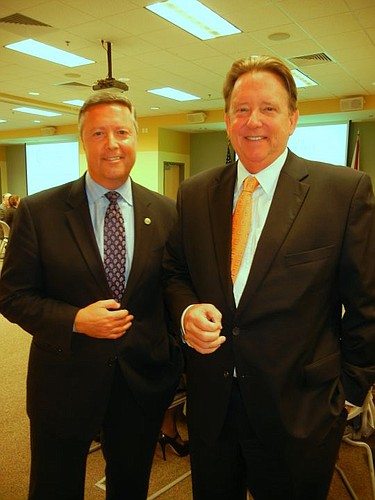
In what was considered a first, Jacksonville University President Tim Cost and University of North Florida President John Delaney shared their insights publicly Tuesday about preparing their students for the workforce – and both emphasized relevance.
Relevance of what students are taught. Relevance of employers’ needs. Relevance of the importance of educating and training students for jobs locally and internationally.
More than 80 area business executives, JU professors and students gathered to hear Cost and Delaney talk as a team to the Economic Roundtable of Jacksonville, which typically meets at the JU Davis College of Business.
Their topic was “Higher Education’s Challenges to Prepare the Next Generation’s Workforce” and the discussion was moderated by JU Hugh Culverhouse Professor of Economics Hassan Pordeli. EverBank sponsored the event.
Pordeli’s focus was how universities work with companies to produce graduates for the workforce.
Among their comments:
• Relevance. Delaney said UNF is strong in transportation and logistics, music, nursing and education, among other areas. “The key is to make sure we’re relevant,” he said about producing graduates with skills needed in area and global industries. Cost said a liberal arts education produces students with many skills, including writing, decision-making and critical thinking. In addition, the college considers “where can we be most relevant to the people in this room.” He talked about JU’s focuses on logistics, nursing, finance and accounting, and marine sciences, among other areas.
• Small business. Delaney said placement is important in finding jobs for graduates and that UNF has a high rate of internships in the area, and always seeks feedback. Cost said large companies can hire graduates and put them through management programs and train them over a few years, while small businesses need production immediately. “With small business, you have no cushion,” he said. “In a small company, it’s RIO Day One,” he said, referring to the return on investment in hiring an employee. “They do not have six-12 months to bring them up to speed.”
• Jacksonville. Asked what universities need to keep graduates from leaving Northeast Florida and choosing to stay and work in the area, Delaney said: “Jobs in Northeast Florida that pay well.” Cost said if graduates can land jobs in local companies, they are more likely to remain in the area. Delaney is incoming chair of the JAX Chamber and a past chair of the JAXUSA Partnership, the chamber’s economic development division.
At the end of the meeting, Economic Roundtable President Sarah Arteaga presented Delaney and Cost $1,000 scholarships for students at their universities. The roundtable board approved a scholarship program and the initial choices were for JU and UNF for the first two.
Cost and Delaney emphasized the collegiality among Jacksonville area colleges and university presidents. In fact, Cost, in his position for 14 months, welcomed Delaney, a former mayor and UNF president since 2003, by stating Delaney has been “gracious at every single turn.”
“There has been no one more welcoming,” Cost said, adding that it was in the best interests of the four Jacksonville institutions of JU, UNF, Florida State College at Jacksonville and Edward Waters College to work as partners in student development and meeting community workforce needs.
Delaney said he concurred.
The teamwork was underscored after the event when Cost took Delaney on a campus tour on a golf cart on the rainy afternoon.
@MathisKb
(904) 356-2466